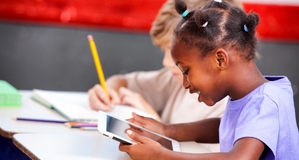The Technological InvasionToo Much Tech Harms Reading Retention in Young Children
By
2016, Vol. 8 No. 03 | pg. 1/1
KEYWORDS:
For today's children, technological devices such as iPads, smartphones, and e-readers are quickly replacing more traditional "toys" as sources of learning and entertainment. With their capacity to contain a multitude of activities within a single device, tech devices are the new norm and are being utilized from a young age. Many critics have explored the negative implications that technology has on reading and learning, and while it may seem like iPads and other technological devices are a convenient way to keep young children entertained and distracted, it has also been shown that reading habits are negatively impacted when reading is done on a device. Technology overuse can contribute to developmental delays and decreased personal interactions and experiences that encourage the use of creativity and imagination. As a result, it is suggested that children's exposure to technological devices should be limited. The advent of e-readers, handheld devices in which electronic versions of books and other reading materials can be read, has changed the world of reading. For the sake of convenience, many parents opt to give their children e-readers rather than physical books. E-books can be downloaded and opened with the click of a button. However, as Jabr (2014) points out, e-readers have few benefits for young children. A study found that when reading their three to five- year old children an electronic book with sound effects, parents had to pause in the middle of their stories to stop their children from playing around with the buttons on the screen. This type of distraction leads to lower retention rates and a lower attention span of the children as they were reading. On the other hand, “children followed the stories in paper books just fine” (Jabr 104). Living in the digital age does not mean that parents are required to expose their children to technology practically from the moment of birth. Young children need to be able to read without distractions to reach maximum retention of the knowledge they are taking in through the text. In the study cited above, the bells and whistles of the e-reader were enough to significantly impact their reading experiences. Children begin developing the foundations of their reading habits during these ages, from birth to five years old, which can make the evidenced reading implications serious inhibiting factors to a child’s reading success later on, because the child is actively practicing the habit of distracted reading and setting a pattern of poor reading recall as a result.The distracting nature of e-readers creates more than just reading recall problems. The distractions from all of the gadgets and the constant scrolling through the text that must be done on e-readers, make it harder for readers to fully use their imagination than if they were reading a paper book.
A child’s imagination is important for their cognitive development, and e-readers can impede this necessary process by limiting the physicality of reading and the mental stimulus it brings. For children, the benefits of physical books far outweigh the benefits of e-readers. With all the negative implications that e-readers can have on children cognitively, it is best that their access to these is extremely limited if not curtailed completely until they are much older, and their brains are more fully developed. E-readers are not the only technological devices that children should have limited access to. In the digital age, children are spending more and more time with technology and in front of various screens, namely television and computers. In “Young Children and Screen Time (Televisions, DVD’s, Computers)” Padma Ravichandran and Brandel France de Bravo discuss the negative impacts screen time can have on young children three and under. The reality is that “not only has screen time been linked to language delay and smaller vocabularies, but studies show that the more television infants and toddlers are exposed to, the more likely they are to be inactive and obese, have difficulty sleeping, and show aggression” (Ravichandran and de Bravo 2). Overexposure to screens is leading to a large amount of health and developmental problems, from language developmental delays to physical and emotional strain. These negative side effects, occurring during a child’s formative years, can have lifelong health impacts because they create bad patterns and habits that can not be easily undone. This overexposure to television and computer screen time often also limits a child’s play time, which is important to their development. Parents are substituting play time for screen time out of convenience, even though it has been shown that “[p]lay provides children with opportunities for different types of learning – physical, social, emotional, intellectual, and language development – in a context they understand” (Ravichandran and de Bravo 3). Without these experiences, children miss out on invaluable formative cognitive, social, and physical well being experiences. Play time, especially in a child’s developmental years, is where the child begins to learn how to interact with others as well as retain information. Technology takes away from these important times, and the implications of this reach far past adolescence because these experiences lay the foundation for a person’s personality and behavior. Beyond developmental delays, screen time can effect the way children handle situations and how they respond to the world around them in a negative manner, creating patterns of poor behavior and negative reactions to everyday situations. For young children, especially those who are under three, there is too much at stake and too much to lose by exposing them to excessive amounts of screen time. Too much technological exposure can contribute to developmental delays and effect the overall well being of children, which is why it should be extremely limited. A common counter to the idea that screen time can cause permanent negative physical and mental health effects is that the effects can be combated with physical exercise. The article “Children’s Screen Viewing is Related to Psychological Difficulties Irrespective of Physical Activity” shows that this is not the case. The authors found that “children who spent more than 2 hours per day watching television or using a computer were at increased risk of high levels of psychological difficulties” (Paige et al. e1101) based upon a study that gave children with self- reported amounts of television watching a Strengths and Difficulties Questionnaire and then analyzed the results with respect to physical activity. These statistics show how some of the negative effects screen time can have on health are neither reversible nor combated with physical exercise. The negative psychological impacts that screen time can have on a young child’s health are very real and very hard to undo once incurred. Overexposure to screens can leave children with serious psychological difficulties that are very hard to overcome, which is why screen time needs to be limited for young children. Technology and screen time should also be limited because they have negative effects on parent-child interaction. In “Once Upon a Time: Parent–Child Dialogue and Storybook Reading in the Electronic Era,” a study that looked at the effect of electronics on reading, “results revealed that parent–child dialogic reading and children's story comprehension were both negatively affected by the presence of electronic features” (Parish-Morris et al. 200). The electronic features disrupted the parent-child interaction because parents had to focus more on stopping their child “from fiddling with buttons and losing track of the narrative” (Jabr 104), than simply on the personal bonding and interaction with their child that reading experiences bring to parent-child relationships. Reading is an attachment based activity that develops bonds between children and their parents during the child’s formative years. This bond and parental interaction has huge impacts on how the child interacts with others and forms relationships throughout their life. Technology interrupts this bonding experience which can in turn weaken the bond between child and parent. As when technology is used as a convenience to distract a child or give them something to play with, it is serving as a substitute for a meaningful parent-child interaction. If this occurs without moderation, it can serve as a strain on the parent-child relationship and negatively impact the relationships a child forms throughout their lives. Because technology can negatively impact a child’s interaction with their parents during their formative years, it should be limited or curtailed completely. Technology does not just negatively impact parent-child interactions. It has been shown that the digital age has changed how children interact with each other. Social interaction is now shifting as personal interaction undergoes a digitalization, as “mail and chat rooms have changed how young people communicate with each other, and computer and video games are a source of conversation and interaction among many children today” (Wartega and Jennings 36). Technology is changing the way people are interacting, with personal interactions over technology versus face to face. While computers can “lead to group interaction and cooperation rather than social isolation” (Wartega and Jennings 36), they reduce face to face personal interactions which can negatively effect how children interact in social situations that are personal rather than in chat rooms or message boards. Children are not being exposed enough to face to face situations where they can hone their verbal communication skills. It may be good that children can converse with multiple people over type and text, but knowing how to converse over the Internet is completely different from conversing verbally. Rather, they are simply learning how to interact with people online versus in person, which can negatively impact their communication skills. While they are still gaining some communication skills from these digital experiences, children are missing out on learning and practicing how to deal with people in person. This can severely limit their psychological development and them later on in life when interpersonal skills become necessary in higher education and the workplace. Furthermore, these limitations can negatively impact later personal relationships if a child has never learned how to meaningfully interact with people personally and has only experienced meaningful interactions online. Access to technology needs to be limited for children so that they can learn how to meaningfully interact with people face to face and therefore be shielded from some of the limitations that children who have been overexposed to technology face in social interactions. When children’s interactions are mainly over the web, they also lose out on skills such as emotion reading that comes with the experience of personal interaction. A study that took teens away from screens for five days and analyzed the results “found that children who were away from screens for five days with many opportunities for in-person interaction improved significantly in reading facial emotion (DANVA 2), compared to those in the control group, who experienced their normal media exposure during an equivalent five-day period” (Uhls et al. 387). The fact that being away from devices for only five days produced such significant impacts on personal interaction and emotional perception shows the negative hold that devices can have on children. Personal interactions occur everyday and proper skills and reactions to these situations are necessary as children get older and encounter more social interaction in school and professional interactions in the workplace. If the basic perception of another person is being effected due to technology when children are young, by the time they grow older and enter the adult world, their social skills and perceptions may be impacted beyond repair because they have been practicing improper habits and reading improper cues for the majority of their lives. Children’s access to technology needs to be limited so they can experience and practice reading emotional cues in situations with face to face personal interaction when they are young, thereby developing necessary social skills so that when they are older and encounter both more technology and social situations, they already know how to react and respond appropriately and will not be effected negatively with their greater access to technology. Therefore, if children are improperly reading emotions because of their screen time and constantly misreading people as a result, they will not be able to develop the necessary skills to interact with people on a daily basis when they are older. Thus, their screen time must be limited until they have experienced enough personal interaction to have satisfactorily developed their interpersonal communication skills. As the world becomes increasingly digitalized, technology is becoming a unique part of the human experience. While it may be unavoidable in some instances, it does not mean that its exposure cannot be limited. Living in the digital age does not mean that parents are required to expose their children to technology practically from the moment of birth. Overexposure to technology can adversely effect reading habits, and negatively impact development and personal interactions during a child’s formative years. Therefore, it is necessary that a child’s exposure to technology is limited or curtailed completely. ReferencesJabr, Ferris. “Why the Brain Prefers Paper.” Scientific American. Nov 2013.48-53. Rpt in The Best American Science and Nature Writing. Ed. Deborah Blum. Boston: Houghton Mifflin Harcourt, 2014. 231-237. Print. Paige, Angie S., Dr., Ashley R. Cooper, Dr., Pippa Griew, and Russell Jago, Dr. "Children’s Screen Viewing Is Related to Psychological Difficulties Irrespective of Physical Activity." Pediatrics 126.5 (2010): e1011-017. Web. 4 Nov. 2015. Parish-Morris, J., Mahajan, N., Hirsh-Pasek, K., Golinkoff, R. M. and Collins, M. F. (2013), Once Upon a Time: Parent–Child Dialogue and Storybook Reading in the Electronic Era. Mind, Brain, and Education, 7:200–211. doi:10.1111/mbe.12028 Ravichandran, Padma, and Brandel France De Bravo. "Young Children and Screen Time." National Center For Health Research. N.p., 2010. Web. 27 Oct. 2015.< http://center4research.org/child-teen-health/early-childhood-development/young-children-and-screen-time-television-dvds-computer/> Wartega, Ellen, and Nancy Jennings. "Children and Computers: New Technology— Old Concerns." The Future of Children 20.2 (2010): 31-41. Web.< https://www.princeton.edu/futureofchildren/publications/docs/10_02_01.pdf> Yalda, Uhls, Michikyan Minas, Morris Jordan, Garcia Debra, Small Gary, Zgourou Eleni, and Patricia Greenfield. "Five Days at Outdoor Education Camp Without Screens Improves Preteen Skills with Nonverbal Emotion Cues." Computers and Human Behavior 39 (October 2014): 387-92. Web.< http://ac.els-cdn.com/S0747563214003227/1-s2.0-S0747563214003227-main.pdf> Suggested Reading from Inquiries Journal
Inquiries Journal provides undergraduate and graduate students around the world a platform for the wide dissemination of academic work over a range of core disciplines. Representing the work of students from hundreds of institutions around the globe, Inquiries Journal's large database of academic articles is completely free. Learn more | Blog | Submit Latest in Education |


















